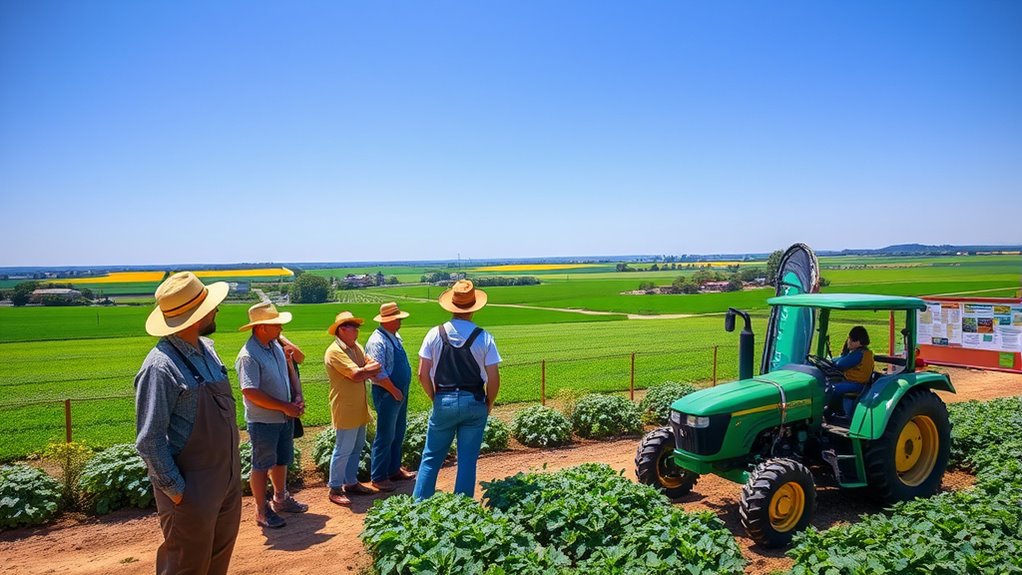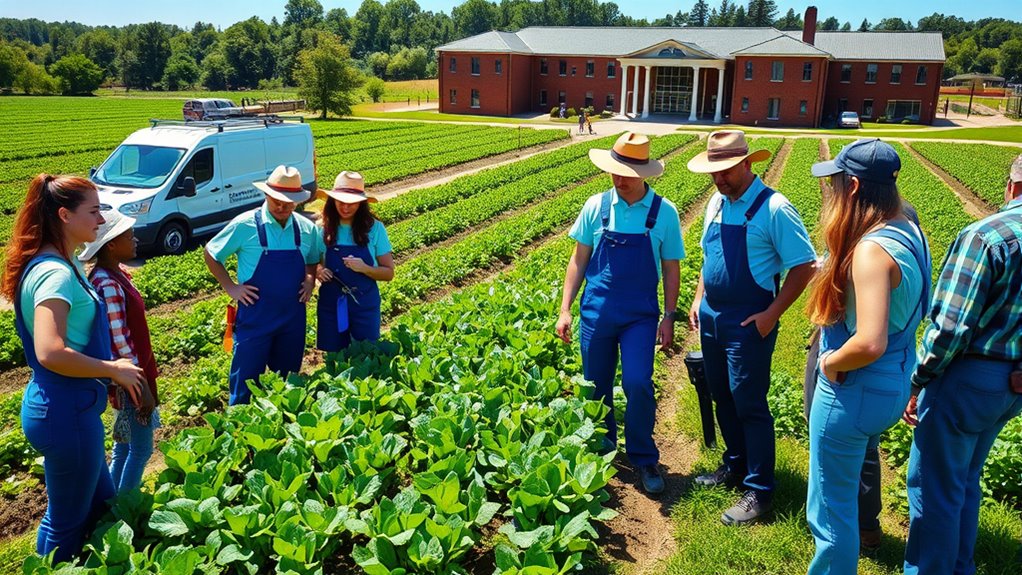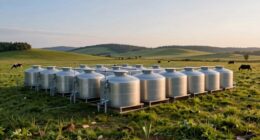Agricultural colleges and extension services play a vital role in advancing farming practices and supporting rural communities. They serve as hubs for adopting new technologies like GPS-guided equipment, drones, and data analytics, which boost productivity and sustainability. As enrollment grows, these institutions expand programs and research efforts. They also foster rural development through hands-on projects and farmer training. Keep exploring to discover how these institutions are shaping the future of agriculture and food security.
Key Takeaways
- Agricultural colleges serve as hubs for research, education, and training to advance farming practices and rural development.
- Extension services utilize educated professionals to deliver practical training and innovative solutions to farmers.
- Technological advancements in agriculture require skilled graduates to implement tools like GPS, sensors, and data analytics.
- Higher student enrollment enhances digital literacy, facilitating better adoption of modern agricultural technologies.
- Collaboration between colleges and extension services promotes knowledge dissemination and sustainable rural growth.

Agricultural colleges and extension services play a pivotal role in advancing farming practices and supporting rural communities. These institutions are at the forefront of integrating technological advancements into agriculture, helping farmers adopt innovative tools and techniques that boost productivity and sustainability. As technology evolves rapidly, agricultural colleges serve as essential hubs where new research is translated into practical applications. They train students in the latest advancements, guaranteeing that future farmers and extension workers are well-equipped to handle modern challenges. Increased student enrollment in these colleges reflects a growing recognition of agriculture’s importance in addressing food security and rural development. When more students choose to study agriculture, it signals a commitment to improving farming through knowledge and innovation.
Growing student enrollment underscores agriculture’s vital role in ensuring food security and rural development through innovation and education.
You’re likely aware that technological advancements have transformed the agricultural landscape. From precision farming to drone technology, these innovations depend on skilled individuals who understand how to implement and manage them effectively. Agricultural colleges play a key role in this shift. They offer specialized programs that teach students about sensor technology, GPS-guided equipment, and data analytics. By staying current with technological trends, these colleges guarantee their graduates can introduce and maintain cutting-edge practices in the field. This not only benefits individual farmers but also enhances overall agricultural productivity and environmental sustainability.
Student enrollment is a significant indicator of the health and relevance of agricultural education. Higher enrollment numbers mean more future practitioners are being prepared to meet global food demands and tackle climate challenges. As more students enroll, colleges broaden their curricula and facilities, creating a dynamic learning environment that keeps pace with technological innovations. This influx of students often leads to increased research activity, fostering new discoveries that can be shared through extension services. These services act as a bridge, disseminating knowledge from colleges to local farmers, guaranteeing that innovative practices reach the wider community.
Furthermore, growing student enrollment strengthens the connection between academic research and real-world application. When students engage in hands-on projects, internships, or community outreach, they directly contribute to rural development. Extension services rely heavily on this influx of motivated, educated individuals to deliver training, workshops, and technical support to farmers. As a result, agricultural colleges and extension services work hand in hand, creating a robust system for continuous improvement in farming practices. Additionally, increased enrollment can enhance digital literacy among future agricultural professionals, enabling them to leverage new technological tools effectively in their work.
Frequently Asked Questions
How Do Agricultural Colleges Select Their Student Intake?
You’re selected through a thorough admission process that evaluates your academic records, entrance exam scores, and sometimes interviews. Agricultural colleges set specific student selection criteria, focusing on your interest in agriculture and related skills. They review applications carefully, considering your background and motivation. If you meet their standards, you’re admitted, ensuring they select students who are passionate and capable of succeeding in agricultural studies.
What Are the Funding Sources for Extension Services?
Oh, the irony isn’t lost on you—extension services are funded by government grants and private donations, yet their essential work often flies under the radar. You’ll find that these sources keep the programs running, supporting farmers and communities alike. It’s a delicate dance of public funds and generosity, ensuring that agricultural knowledge reaches everyone. Without these funds, the extension services wouldn’t be able to do their important work.
How Do Extension Services Adapt to Climate Change Challenges?
You can adapt extension services to climate change challenges by promoting climate-resilient practices and integrating adaptive technology. You’ll educate farmers on sustainable methods like crop diversification and water conservation, helping them manage unpredictable weather. Using innovative tools like weather forecasting apps and soil sensors, you can provide real-time data to support decision-making. This approach empowers farmers to respond proactively, building resilience against climate impacts and ensuring long-term agricultural productivity.
Are There Online Courses Available in Agricultural Colleges?
Yes, you can find online courses at agricultural colleges. These courses often feature virtual labs, interactive modules, and online certifications, making learning accessible and flexible. You get to explore new skills, deepen your knowledge, and advance your career from anywhere. With innovative tools like virtual labs and recognized certifications, you can actively engage, grow confidently, and embrace agriculture’s future—all at your own pace.
How Do Extension Programs Measure Their Impact?
Extension programs measure their impact through impact assessment, which often involves gathering farmer feedback to evaluate how well the program has improved practices or yields. You should look for data on changes in productivity, income, or adoption of new techniques. By analyzing this feedback and data, extension services can determine their effectiveness and make adjustments to better serve farmers’ needs.
Conclusion
As you explore agricultural colleges and extension services, remember that knowledge is power, and sharing it is even more valuable. These institutions equip you with essential skills and support, helping you grow your farm and community. Just like the saying goes, “A rising tide lifts all boats.” Embrace learning and collaboration, and you’ll see your efforts flourish. Keep nurturing your passion, and success will follow naturally.










